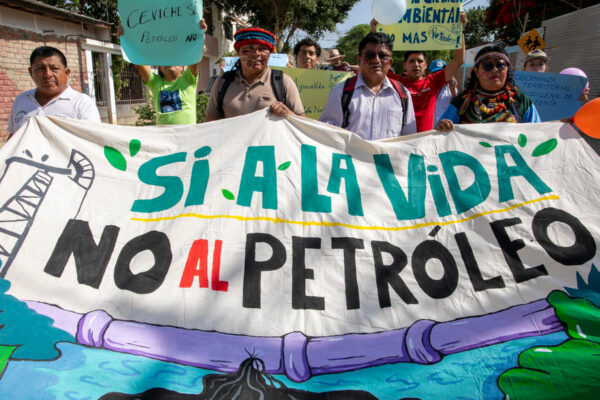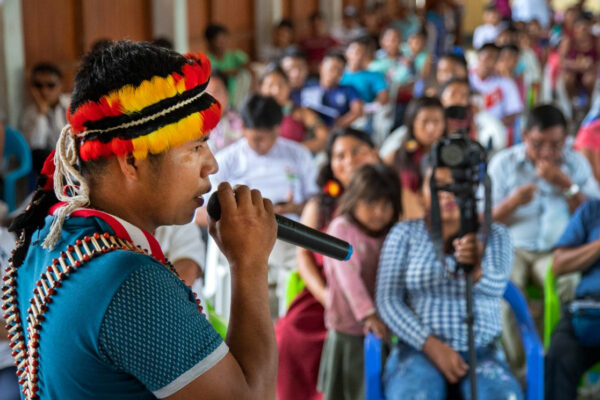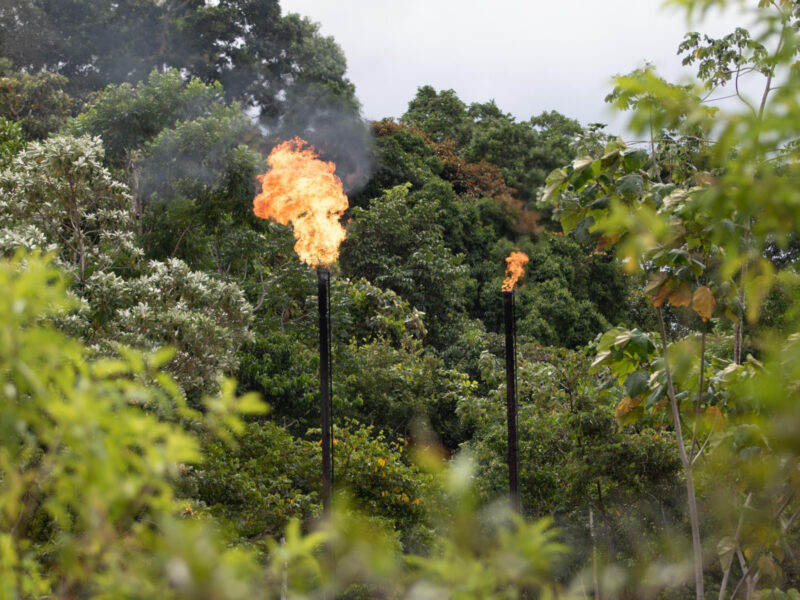New York, NY – Today, Amazon Watch released a new report, Assessing Petroperú’s Financial, Legal, Environmental, and Social Risks, exposing the elevated risks of financially supporting state-run oil company, Petróleos del Perú S.A (Petroperú), amid its controversial plans to expedite new oil drilling in the Amazon contradicting a scientific mandate to stop oil expansion.
Though these plans undermine Indigenous rights, pose tremendous risks to the climate, and puts investments by financial backers at risk, U.S. commercial banks, such as Citi and JPMorgan Chase, look to provide more support for the company, for up to $1 billion. The two banks, which steadily face intense scrutiny from investor-led resolutions on climate and Free, Prior, and Informed Consent at banks’ Annual General Meetings (AGM), look to deepen business relationships with Petroperú.

Amazonian Indigenous leaders traveled thousands of miles to New York City and Washington, DC as a direct response from the Peruvian organizations, which expressed deep concern about the new deal. Delegates, each representing thousands of community members respectively, call on banks to halt new financing for Petroperú, just ahead of the banks’ AGMs in April and May. With them are the new reports, which provide new evidence of the destruction that more fossil financing can bring forth.
According to the report, new capital for Petroperú could drive more oil production to pay off its costly $6.5 billion Talara Refinery, incentivizing new oil drilling in the north Peruvian coast and the Peruvian Amazon. Conflicts around the world have made oil imports too expensive, as evidenced by Petroperú’s own financial statements, the report finds. Therefore, the opening of new domestic oil fields are the only possible alternative for the company to pay off its existing debts to banks abroad.
It also includes new information on Petroperú’s contentious North Peruvian Pipeline, which is shown to overlap a gigantic wetland designated as a RAMSAR site – the Pastaza Abanico – known as the third largest forest carbon stock in the world. The report includes new oil spill data that jeopardizes this site.
The report also details growing community opposition across key oil blocks slated for oil drilling. It highlights the formation of a coalition of seven Indigenous nations and coastal fishing communities called the MarAmazonía alliance that poses an imminent threat to the success of Petroperú’s oil expansion plans.
Actions by commercial banks to hold risky clients accountable for mitigating rights issues and transitioning out of fossil fuels remain highly ambiguous and ineffective, especially for legitimate stakeholders. This is evidenced by a public statement from the Achuar, Wampís, and Chapra peoples expressing serious concerns about Citi’s report, Respecting the Rights of Indigenous Peoples released in early April:
“Citi talks about respecting the Free, Prior and Informed Consent of Indigenous communities as set down by the UN, but it has clients like Petroperú which refuse to recognize the right to say no of seven Indigenous nations in the Peruvian Amazon. Petroperu’s disregard for Indigenous rights should mean something to the banks that lend them money; but in reality their mutual business continues. If they are serious about Indigenous rights, Citi must hold its clients accountable to ensure that their due diligence adheres to international standards of Free, Prior and Informed Consent.”
Olivia Bisa, President of the Autonomous Territorial Government of the Chapra Nation in Perú
Likewise, the report also looks into Petroperú’s 2023 TCFD transition plan, which, at a basic level, fails to acknowledge the role of oil companies and new oil drilling in contributing to climate change. Financiers and investors which opt to back the company will inevitably undermine the climate.
In conclusion, commercial banks, especially those located in the United States and the broader Global North, continue to incessantly pour billions of dollars into fossil fuel projects and clients, plunging not only individual companies in debt, but entire countries as well. Such is the case with banks’ continued financial support for the state-run company, Petroperú, and other oil entities.
“A decision to pump more capital to Petroperú and the Peruvian oil industry will only plunge the entire country deeper in debt and oil dependency, obstructing any plans for it to make a just transition out of fossil fuels. Financial support for such companies, which banks may consider as a helping hand for countries categorized as ‘emerging markets,’ do the exact opposite. Instead, this financing aggravates impacts to communities, such as Indigenous peoples, who bear among the worst consequences of the climate crisis.”
Ricardo Pérez Bailón, Amazon Watch Communications Advisor in Perú
Background
This report serves as an update to The Risks of Investing in Petroperú, released in 2022. Petroperú operates primarily in the downstream, with its principal asset being its Talara Refinery. It also operates in the midstream, with its North Peruvian Pipeline, and recently has returned to its upstream business and now looks to drill more oil in blocks located in the Peruvian Amazon and north Peruvian coast, with other operating partners.
This visit is not the only time where a Peruvian delegation raised concern with banks’ fossil fuel financing. In 2022, a delegation composed of leaders from the Achuar, Wampís, and a fisherfolk community, met with U.S. banks such as Citi, JPMorgan Chase, Bank of America, and Goldman Sachs to discuss issues with its client, Petroperú.
In addition, in preparation for their visit to New York City, the alliance gathered in the city of Talara in March of 2023, where Petroperú’s refinery is located, to discuss the consequences of oil activities in their local communities.













